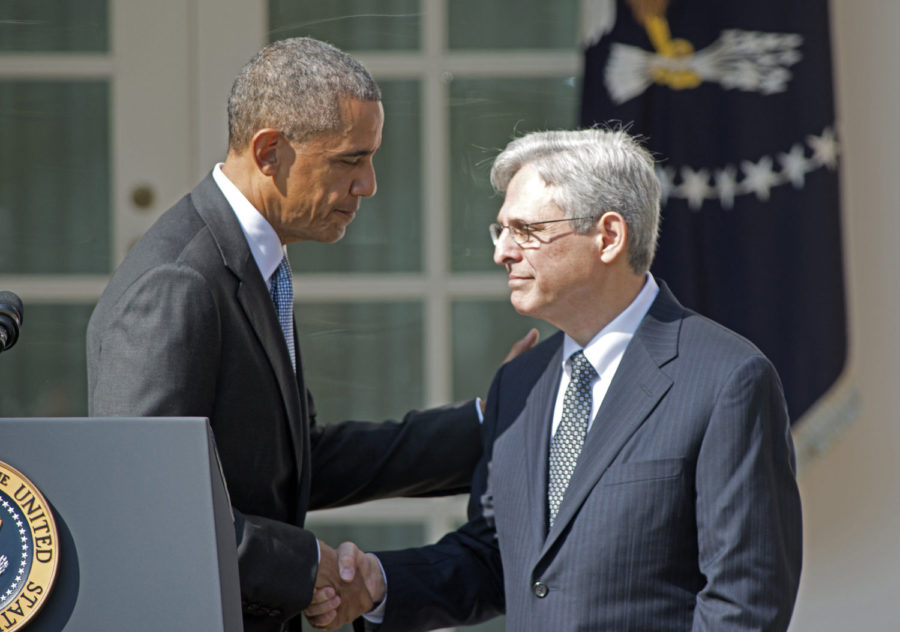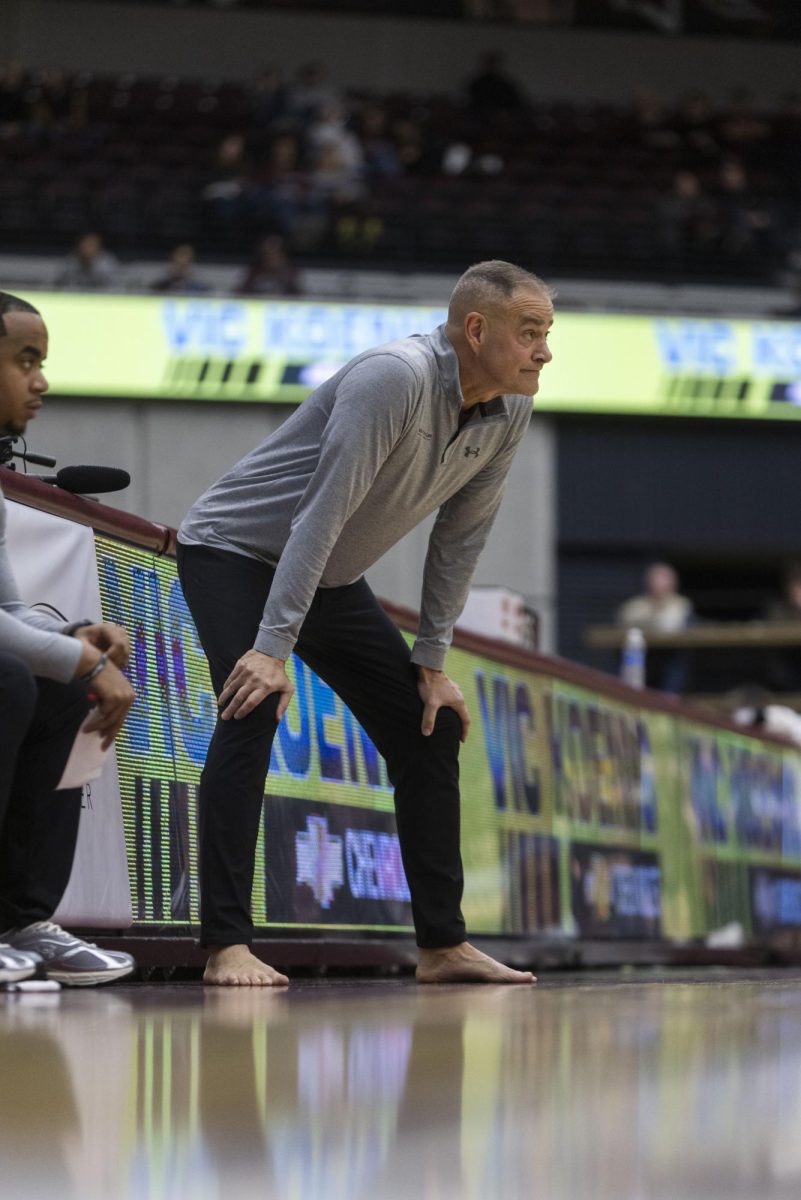Obama makes his case at U. of C. for Supreme Court nominee
April 8, 2016
President Barack Obama returned on Thursday to the University of Chicago where he spent more than a decade teaching constitutional law, promoting his Supreme Court nominee and contending that Senate Republicans’ refusal to vote on native Illinoisan Merrick Garland represents an increasingly “dangerous” politicization of the courts.
Speaking for nearly 90 minutes in a town-hall setting that featured questions from students at the University of Chicago Law School, Obama also touched on a broad array of topics that included his defense of drone technology in warfare, opposition to limiting voting rights and view that the divergence within the Democratic Party between supporters of Hillary Clinton and Bernie Sanders is not comparable to divisions within the GOP.
But it was Obama’s defense of Garland that was paramount to his visit, calling the chief judge of the U.S. Court of Appeals for the District of Columbia Circuit “as good of a judge as we have in this country right now.”
Advertisement
“Merrick Garland is an extraordinary jurist who is indisputably qualified to serve on the highest court of the land and nobody really argues otherwise,” Obama said.
Citing Senate Republican leader Mitch McConnell’s vow not to allow confirmations on any nominee put forth by Obama to replace the late Supreme Court Justice Antonin Scalia, Obama said “what’s not acceptable is not giving [Garland] a vote, not giving him a hearing, not meeting with him” and trying to “nullify” the ability of a president to make an appointment.
“If you start getting into a situation where the process of appointing judges is so broken, so partisan, that an eminently qualified jurist cannot even get a hearing, then we are going to see the kind of sharp partisan polarization that has come to characterize our electoral politics seeping into our judicial system,” the president said.
“That erodes the institutional integrity of the judicial branch. At that point, people lose confidence in the ability of the courts to fairly adjudicate cases and controversies. Our democracy cannot afford that,” he said.
Obama described the Republican leadership’s attempts to block Garland as “a circumstance in which those in the Senate have decided that placating [their] base is more important than upholding the constitutional and institutional roles in our democracy in a way that is dangerous.”
If Republicans continue, Obama said, he would expect Democrats to challenge any nominee if a GOP presidential contender is elected in November, prompting McConnell and a Republican Senate majority to end the use of the filibuster by the minority party to block consideration of Supreme Court justices.
Garland was born in Chicago, grew up in suburban Lincolnwood and attended high school in Skokie. Obama said he chose Garland because he believed it was a “good moment to have somebody who is respected by both sides” up for consideration.
Advertisement*
When asked by a student to explain how the court would be made more diverse by Garland’s appointment, Obama quipped, “Well, he’s from Skokie,” before launching into a measured but firm defense of his record on bringing diversity to the federal court system.
“Not to brag, but I have transformed the federal courts, from a diversity standpoint, with a record that’s been unmatched,” Obama said. He said he never approached the appointment for the Scalia vacancy as a matter of diversity. “Yeah, he’s a white guy, but he’s a really outstanding jurist, sorry,” Obama said of Garland.
He acknowledged that some on the left may not be happy with his choice of Garland, and said that while he will continue to back progressive causes — trying to fight climate change and promote educational opportunity, health care and criminal justice reform — they are issues that are typically advanced in the political process and not by the nation’s highest court.
The casual format of the town hall session allowed Obama the opportunity to banter with the audience, and he used it liberally, joking repeatedly about the student’s formal attire and their attachment to their phones.
“I’m just saying, you guys might want to practice” speaking without reading from a smartphone in a courtroom setting, Obama joked as one law student was preparing to ask him a question.
But the students had more than just questions about Garland.
Asked about using “vague legal standards” to conduct drone strikes that kill civilians, Obama acknowledged that when he took office, technology of the weaponry had advanced faster than military commanders’ rationale for using it.
“The challenge for me as commander in chief has consistently been how do you think about this new technology in a way that is consistent with morality, ideals, laws of war, but is also consistent with my first priority as president and commander in chief, which is to keep all of you safe,” he said.
Obama said a presidential directive was written regarding use of drones and said “there’s no doubt some innocent people have been killed” by using them. But, he said, the rate of civilian casualties in drone strikes was less than in conventional war.
The two-term president also was asked whether the divisions that have affected the Republican Party will also surface among Democrats divided between Clinton, a former secretary of state, and Sanders, a Vermont senator, as their presidential nominee.
“The cleavages inside the Democratic Party are not comparable to what we’re seeing in the Republican Party right now,” Obama said, adding that Democratic divides are “more about means, less about ends.” Still, he acknowledged that in both parties there is anger shared over stagnant incomes and frustration at economic recovery, Wall Street and Washington amid “a sense the game is rigged” against them.
Obama said the law students will face differing courtroom issues from the days when he served as a lecturer at the school from 1992 to 1996, and a senior lecturer from 1996 to 2004, when he was elected to the Senate. The university has said that with his senior lecturer status at the law school, he is considered to have been a professor.
Obama noted that the debate over the encryption of smartphones — stemming from the FBI’s desire to have a court order Apple to unlock a phone in a terrorist investigation — reflected the conflicting nature of personal privacy versus safety and security.
But he saved his greatest concerns for laws that diminish the ability of the public to vote, such as requiring identification at the polls.
“At this point, we should be at the point where we say we want everyone to vote. That is the essence of our democracy,” Obama said, citing a history of laws that denied the vote to women and minorities. “There’s no justification for that. You can’t defend it.”
The trip was part of a broader victory lap being taken by the president, who is using his final year in office to revisit the places that shaped his political career. Much like the visit he made to Springfield earlier this year, Obama struck a wistful tone that was punctuated with notes of humor.
Obama made no mention of Illinois Republican U.S. Sen. Mark Kirk’s meeting with Garland last week and Kirk’s statement that GOP leaders should hold a confirmation vote. Kirk, however, also acknowledged such a vote was unlikely to happen under the direction of the chamber’s Republican leadership.
Kirk, one of the nation’s most politically vulnerable Republican senators up for election this year, is seeking re-election against Democratic U.S. Rep. Tammy Duckworth, who was formally endorsed by the president on Wednesday.
Kirk, who met with Garland a week ago, released a copy of a note from Obama in which the president said, “Thank you for your fair and responsible treatment of Merrick Garland. It upholds the institutional values of the Senate, and helps preserve the bipartisan ideal of an independent judiciary.”
Kirk turned down an invitation to fly to Chicago with Obama and opted to stay in Washington but said he appreciated the president’s offer.
The president’s visit came a day after the state’s senior U.S. senator, Democrat Dick Durbin, met with Garland in Washington and said to reporters afterward that the judge was “well qualified to serve on the U.S. Supreme Court.” Durbin flew to Chicago with Obama for the university event along with Democratic U.S. Rep. Mike Quigley of Chicago.
In addition to the university event, Obama also sat down to record an interview with Fox News Sunday host Chris Wallace. The interview, to air Sunday, was Obama’s first appearance on Fox News Channel since 2014 and his first appearance on the Sunday show since being elected president, the network said.
Upon the arrival of Air Force One at O’Hare, Obama was greeted by Mayor Rahm Emanuel, who once served as the president’s first chief of staff. The two chatted briefly before the presidential motorcade headed to the university. Prior to his talk, he met with an overflow room full of law students at the D’Angelo Law Library.
The Chicago event launched a multiday trip by Obama, largely reserved for fundraising in California.
After leaving Chicago, Obama headed to a Los Angeles-area fundraiser for the Democratic Congressional Campaign Committee that was to feature Julia Louis-Dreyfus and Brad Hall, Katie McGrath and J.J. Abrams, Lyn and Norman Lear and Barbra Streisand and James Brolin, the Los Angeles Times reported.
On Friday, Obama will raise funds for Senate Democrats at a breakfast hosted by Tobey Maguire and wife Jennifer.
___
(c)2016 the Chicago Tribune
Visit the Chicago Tribune at www.chicagotribune.com
Distributed by Tribune Content Agency, LLC.
Advertisement









